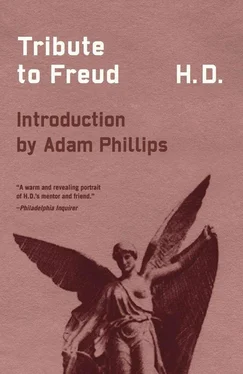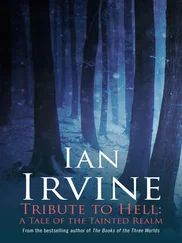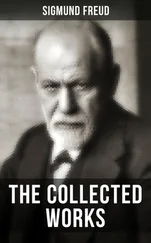Any amateur dabbler with the theories of psychoanalysis can reconstruct, even from this so-far brief evidence, the motive or material or suppressed or repressed psychic urge that projected this dream-picture. There is the little girl with her doll in her father’s study. She has come to her father’s study to be alone or to be alone with him. Her brother’s interests are more lively and exterior and her brother does not enter readily into her doll-family games. He should be the dolls’ father or the dolls’ doctor, who is called in occasionally. But this does not interest him. He has soldiers and marbles and likes to race about, outdoors and indoors. Here in our father’s study, we must be quiet. A girl-child, a doll, an aloof and silent father form this triangle, this family romance, this trinity which follows the recognized religious pattern: Father, aloof, distant, the provider, the protector — but a little un-get-at-able, a little too far away and giant-like in proportion, a little chilly withal; Mother, a virgin, the Virgin, that is, an untouched child, adoring, with faith, building a dream, and the dream is symbolized by the third member of the trinity, the Child, the doll in her arms.
The doll is the dream or the symbol of the dream of this particular child, as these various Ra, Nut, Hathor, Isis, and Ka figures that are dimly apprehended on their shelves or on the Professor’s table in the other room are the dream or the symbol of the dream of other aspiring and adoring souls. The childhood of the individual is the childhood of the race, we have noted, the Professor has written somewhere. The child in me has gone. The child has vanished and yet it is not dead. This contact with the Professor intensifies or projects this dream of a Princess, the river, the steps, the child. The river is an Egyptian river, the Nile; the Princess is an Egyptian lady. Egypt is present, as I say, actually or by inference or suggestion, in the old-fashioned print or engraving of the Temple at Karnak, hanging on the wall above me, as well as in the dimly outlined egg-shaped Ra or Nut or Ka figures on the Professor’s desk in the other room. A Queen or Princess is obvious mother-symbol; moreover, there had been casual references, from time to time, to the Professor’s French translator, Madame Marie Bonaparte, “the Princess” or “our Princess,” as the Professor calls her.
Perhaps here too, as on the occasion of the Professor’s birthday in the house at Döbling, I wanted something different or I wanted to give the Professor something different. Princess George of Greece had been consistently helpful and used her influence in the general interests of the Psycho-Analytical Association. She was “our Princess” in that, as Marie Bonaparte, she had translated the Professor’s difficult German into French and was ready to stand by him now that the Nazi peril was already threatening Vienna. She was “our Princess” in the world, devoted and influential. But is it possible that I sensed another world, another Princess? Is it possible that I (leaping over every sort of intellectual impediment and obstacle) not wished only, but knew, the Professor would be born again?
For things had happened in my life, pictures, “real dreams,” actual psychic or occult experiences that were superficially, at least, outside the province of established psychoanalysis. But I am working with the old Professor himself; I want his opinion on a series of events. It is true, I had not discussed these experiences openly, but I had sought help from one or two (to my mind) extremely wise and gifted people in the past and they had not helped me. At least, they had not been able to lay, as it were, the ghost. If the Professor could not do this, I thought, nobody could. I could not get rid of the experience by writing about it. I had tried that. There was no use telling the story, into the air, as it were, repeatedly, like the Ancient Mariner who plucked at the garments of the wedding guest with that skinny hand. My own skinny hand would lay, as it were, the cards on the table — here and now — here with the old Professor. He was more than the world thought him — that I well knew. If he could not “tell my fortune,” nobody else could. He would not call it telling fortunes — heaven forbid! But we would lead up to the occult phenomena, we would show him how it happened. That, at least, we could do — in part, at any rate. I could say, I did say that I had had a number of severe shocks; the news of the death of my father, following the death in action of my brother in France, came to me when I was alone outside London in the early spring of that bad influenza winter of 1919. I myself was waiting for my second child — I had lost the first in 1915, from shock and repercussions of war news broken to me in a rather brutal fashion.
The second child, for some reason, I knew, must be born. Oh, she would be born, all right, though it was an admitted scientific fact that a waiting mother, stricken with that pneumonia, double pneumonia, would not live. She might live — yes — but then the child would not. They rarely both live, if ever! But there were reasons for us both living, so we did live. At some cost, however! The material and spiritual burden of pulling us out of danger fell upon a young woman whom I had only recently met — anyone who knows me knows who this person is. Her pseudonym is Bryher and we all call her Bryher. If I got well, she would herself see that the baby was protected and cherished and she would take me to a new world, a new life, to the land, spiritually of my predilection, geographically of my dreams. We would go to Greece, it could be arranged. It was arranged, though we two were the first unofficial visitors to Athens after that war. This was spring 1920. This spring of 1920 held for me many unresolved terrors, perils, heartaches, dangers, physical as well as spiritual or intellectual. If I had been a little maladjusted or even mildly deranged, it would have been no small wonder. But of a series of strange experiences, the Professor picked out only one as being dangerous, or hinting of danger or a dangerous tendency or symptom. I do not yet quite see why he picked on the writing-on-the-wall as the danger-signal, and omitted what to my mind were tendencies or events that were equally important or equally “dangerous.” However, as the Professor picked on the writing-on-the-wall as the most dangerous or the only actually dangerous “symptom,” we will review it here.
The series of shadow- or of light-pictures I saw projected on the wall of a hotel bedroom in the Ionian island of Corfu, at the end of April 1920, belong in the sense of quality and intensity, of clarity and authenticity, to the same psychic category as the dream of the Princess, the Pharaoh’s daughter, coming down the stairs. For myself I consider this sort of dream or projected picture or vision as a sort of halfway state between ordinary dream and the vision of those who, for lack of a more definite term, we must call psychics or clairvoyants. Memories too, like the two I have recorded of my father in the garden and my mother on Church Street, are in a sense super-memories; they are ordinary, “normal” memories but retained with so vivid a detail that they become almost events out of time, like the Princess dream and the writing-on-the-wall. They are steps in the so-far superficially catalogued or built-up mechanism of supernormal, abnormal (or subnormal) states of mind. Steps? The Princess is coming down the steps from a house or palace or hall, far beyond our human habitation. The steps lead down to a river, the river of life presumably, that river named Nile in Egypt. She is “our Princess” — that is, she is specifically the Professor’s Princess and mine, “our” personal guardian or inspiration. She is peculiarly “his” Princess for this is a life-wish, apparently, that I have projected into or unto an image of the Professor’s racial, ancestral background. We have talked of his age; his seventy-seven symbolized occult power and mystery to me. I frankly told him this without fear of being snubbed or thought ridiculous or superstitious. It is important to me, that seventy-seven, and I have a seven or will acquire one a few months after his May birthday. Mine is, at the time, a forty-seven, so there is thirty years difference in our ages. But ages? Around us are the old images or “dolls” of pre-dynastic Egypt, and Moses was perhaps not yet born when that little Ra or Nut or Ka figure on the Professor’s desk was first hammered by a forger-priest of Ptah on the banks of the Nile.
Читать дальше











